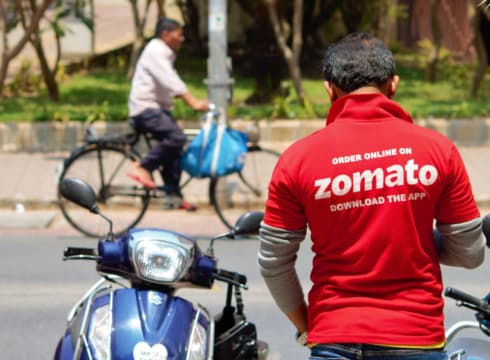The notice received on December 26 to show cause as to why an alleged tax liability of INR 401.7 Cr for the period between October 29, 2019 and March 31, 2022 should not be demanded from the company
The amount alleged in the notice is the one collected by the company as delivery charges from the customers on behalf of the delivery partners
The Gurugram-based company’s shares opened at INR 124.90 apiece during Thursday session, 1.7% lower as compared to its previous close at INR 127.05
Inc42 Daily Brief
Stay Ahead With Daily News & Analysis on India’s Tech & Startup Economy
Foodtech giant Zomato has received an INR 401.7 Cr show cause notice from the Directorate General of GST Intelligence, Pune Zonal Unit, over unpaid tax on delivery charges collected from the customers, it said in an exchange filing.
The notice received on December 26 to show cause as to why an alleged tax liability of the said amount for the period between October 29, 2019 and March 31, 2022 should not be demanded from the company.
“The company strongly believes that it is not liable to pay any tax since the delivery charge is collected by the company on behalf of the delivery partners. Further, in view of the contractual terms and conditions mutually agreed upon, the delivery partners have provided the delivery services to the customers and not the company. This is also supported by opinions from our external legal and tax advisors. The company will be filing an appropriate response to the notice,” Zomato said.
The Gurugram-based company’s shares opened at INR 124.90 apiece during Thursday session, 1.7% lower as compared to its previous close at INR 127.05.
Earlier also reports surfaced that the food delivery giants Zomato and Swiggy reportedly received notices for a cumulative goods and services tax (GST) worth INR 1,000 Cr, as the tax authorities now view delivery charges collected by these platforms as their revenue.
It is important to note that in January 2022, the Centre added ‘restaurant services’ and cloud kitchens under the purview of Section 9(5) of the CGST Act, 2017, which led to the likes of Swiggy and Zomato paying 5% GST on ‘restaurant services’ they offer.
However, it continued to remain unclear whether delivery services and fees collected from that would also be taxed.
The delivery fees charged by both Swiggy and Zomato have consistently been a subject of debate, drawing controversy from various viewpoints.
In 2016, Swiggy started the practice of implementing food delivery fees. Subsequently, Zomato followed suit by introducing its delivery charges.
Having set a standard for delivery fees, Zomato then introduced a loyalty programme, now acknowledged as Zomato Gold. Under this programme, customers can circumvent delivery fees by subscribing to a monthly plan, which also offers additional perks.
Similarly, Swiggy introduced Swiggy One, adopting the concept of exempting delivery fees through a subscription model and accompanying it with supplementary benefits.
Zomato and Swiggy deliver 1.8 Mn to 2 Mn orders per day across the country. The introduction of a new Goods and Services Tax (GST) could potentially disrupt their cash flow.
Meanwhile, both platforms have started imposing a platform fee on orders, with charges varying between INR 2 and INR 5 per order. Notably, this fee applies universally to all customers, irrespective of whether they are subscribed to any specific loyalty program.
Zomato reported its second consecutive profitable quarter, with profit after tax surging to INR 36 Cr during the September quarter of the financial year 2023-24 (FY24). This was an 18X jump from PAT of INR 2 Cr in the preceding quarter.
{{#name}}{{name}}{{/name}}{{^name}}-{{/name}}
{{#description}}{{description}}...{{/description}}{{^description}}-{{/description}}
Note: We at Inc42 take our ethics very seriously. More information about it can be found here.


